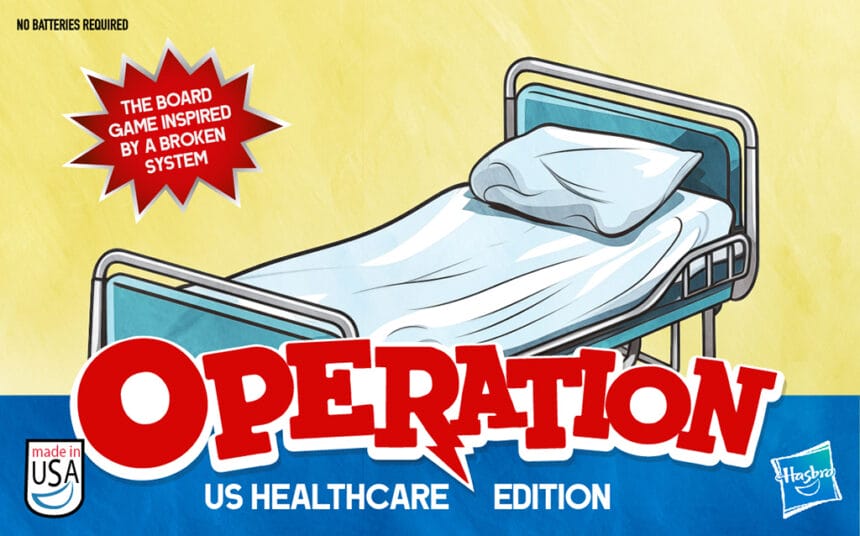If you’ve ever played the board game Operation, you know how hard it is to treat the protagonist, Cavity Sam.
It’s difficult – some would even say impossible – to use that small pair of tweezers to go retrieve bones and organs from the patient and cure him without hitting the sides and triggering the alarm.
That challenge is only heightened in Operation: US Healthcare Edition, a reimagining of the classic Hasbro board game that takes direct aim at the nation’s ailing healthcare system.
The updated version of Operation is the brainchild of three young advertising creatives: Ted Masterson, a copywriter at design agency AKQA, Ian Dickson, a motion designer at Squad 47, as well as Austin Warnick, a freelance art director.
Unveiled ahead of World Health Day on Sunday, Operation: US Healthcare Edition pokes fun at the common issues presented by America’s complex and expensive healthcare system.
Upon opening the game’s box, users will see Cavity Sam’s grave as well as the game manual turned into a funeral program. His tombstone declares that he died due to a lack of healthcare coverage as he couldn’t afford the care he needed.
The game’s pieces have also transformed from bones and organs to spots where users can pay their respect and offer condolences to the deceased character.
Additionally, the funeral program directs people to check out the principles of a Medicare for All-style single-payer system supported by progressives like Sen. Bernie Sanders, (I-VT).
In an interview with MM+M, Masterson said the idea of taking a staple of family board game night and contrasting it with the country’s flawed, frustrating healthcare infrastructure would serve as a cheeky, topical way to spark conversations.
Masterson noted that early on in the development of the game, they considered including numerous aspects of the fragmented healthcare system, such as the billing department, insurers and specialists. However, they opted for a simpler version and since there isn’t a playable function for the game, the shock factor is the intended effect.
He added that the trio are considering a limited physical release of the conceptual art project if it garners enough interest.
Both Masterson and Warnick said their own experiences with navigating the healthcare system, including being kicked off their parents’ health insurance at the age of 26 or losing coverage as a result of a layoff, inspired them to channel their advertising skills into this project.
“It just feels like you’re paying to play this game, but you’re not getting the benefits from it because you’re always going to be paying regardless,” Warnick said. “It’s just an added stress to people who already have so many stressful things going on in their life.”
Another factor that led to the game’s creation was how healthcare was such a focal point in the 2020 presidential election but seems to have taken a backseat to other issues in the 2024 presidential cycle. Masterson said the lack of adequate healthcare coverage still impacts many across the country and should be a priority among candidates for higher office.
Warnick closed with a parting message to his fellow marketers and leaders in the healthcare industry, urging them to consider support for a single-payer system, noting that “another system is possible and shown to work.”







